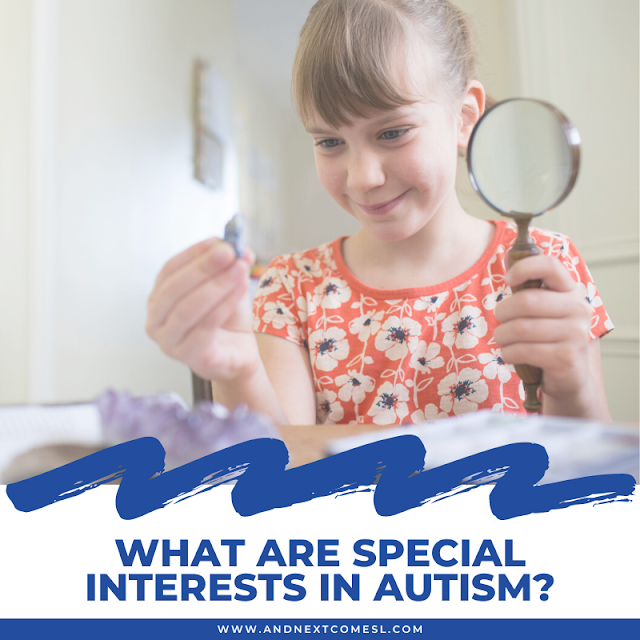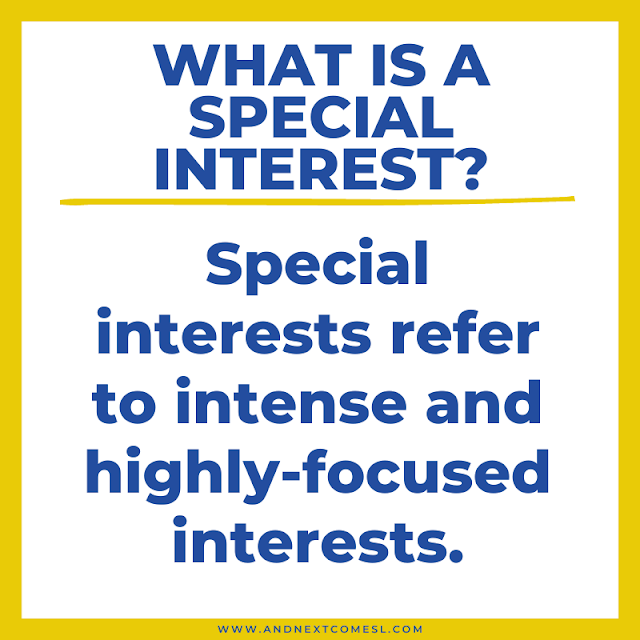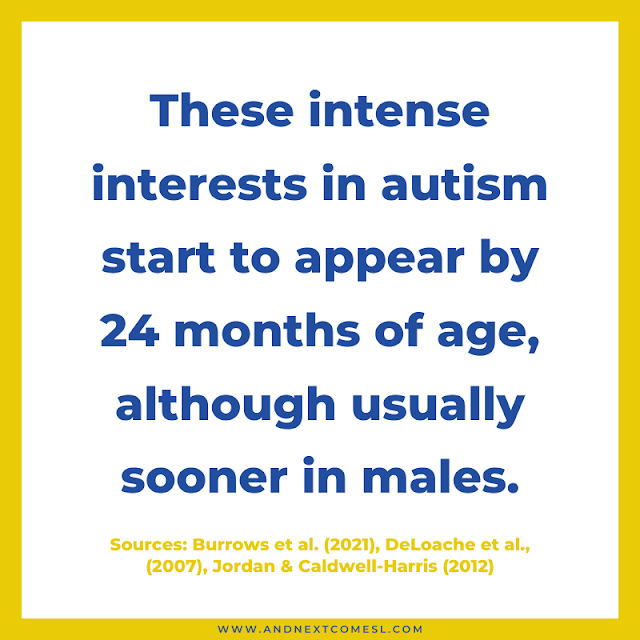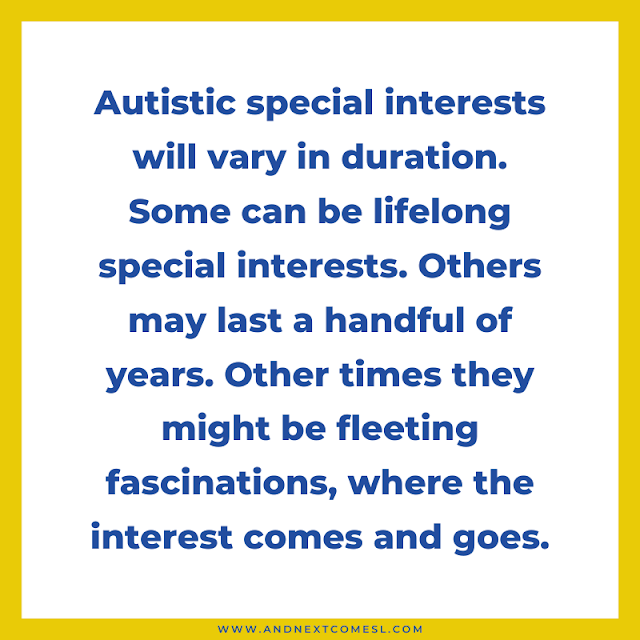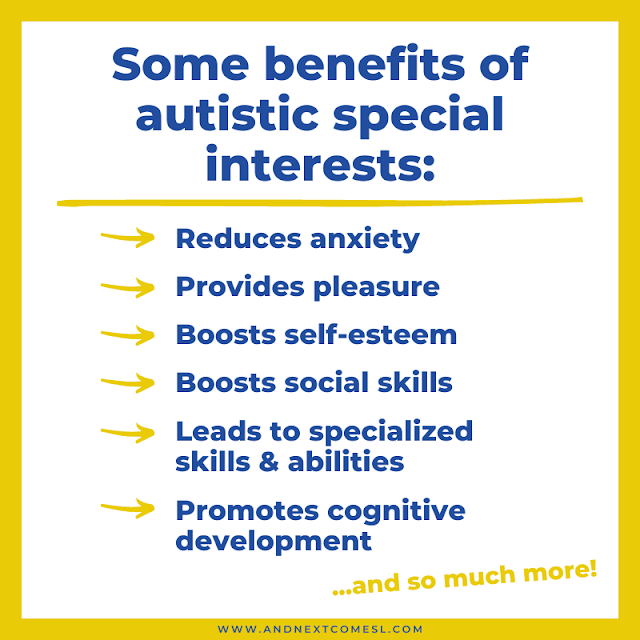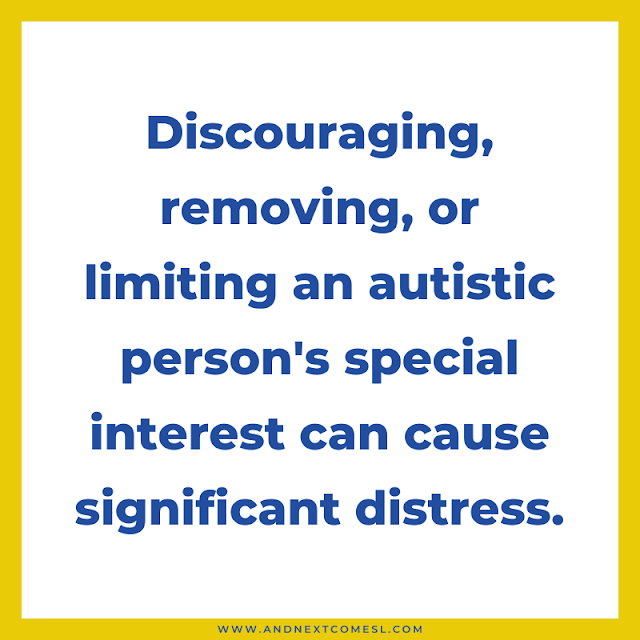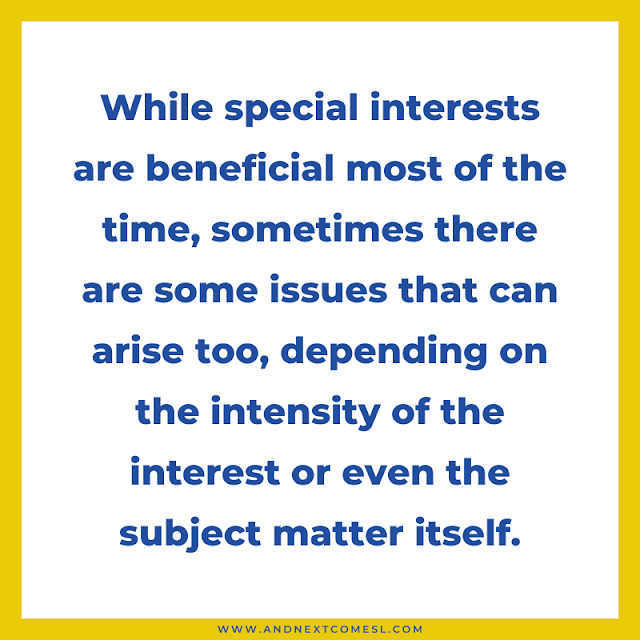Learning about autism means learning about different autistic traits and behaviors, from echolalia and stimming to shutdowns and meltdowns. There's always so much to learn about.
There might also be a lot of unlearning involved when it comes to autism because, frankly, there's a lot of misinformation and terrible advice about autism out there. Like a lot. So unlearning will just have to be part of the process.
However, learning about and understanding these other autism traits and behaviors will give you a much better idea of how autistic individuals perceive and experience the world around them.
When you thoroughly understand these topics, you'll also know how to better support them. As the saying goes, when you know better, you do better.
It's also important to learn about different elements of autistic culture, such as samefoods or special interest areas. Obviously, we're going to look more in depth at special interests here though, given the title of this article, right?
So let's dive into special interests in autism. We'll take a look at some commonly asked questions about these interests and why they're important for autistic people.
So What is a Special Interest Exactly?: Special Interests in Autism Defined
First, we need a definition...Special interests refer to intense and highly-focused interests. They are often "narrow but deep," as Jordan and Caldwell-Harris (2012) note.
So while the subject or topic may be described as unusual, restricted, circumscribed, narrow, idiosyncratic, or simply different, there's an incredibly deep level of passion and intensity behind them. See, narrow and deep.
You will find that there are common interests among autistic individuals, but they can also be highly individual as well. So keep that in mind.
Often these special interests end up being engrossing. And they're usually something that many autistic individuals go all-in on. Hence, why they're usually described as intense interests. And if you're autistic yourself, or are parenting an autistic child, then you know what I mean when I say that they're intense.
Please note that there are a variety of terms that can be used to describe special interests so you may see them referred to by other names. You'll notice that some of the following terms have rather negative connotations. I mean some are pretty pathologizing and infantilizing. Even the word "special" itself is less than ideal.
Other terms on this list, however, are really great such as passions or specialized interests. They simply don't have the same stigma or baggage attached to them as some of the other terms on this list.
Regardless, here are some other terms for special interests that you might encounter:
- Obsessions
- Circumscribed interests
- Unusual interests
- Intense interests
- Restricted interests
- Unusual preoccupations
- Fixations
- Passions
- Fascinations
- Specialized interests
- Specialty subject
- SpIns (a short form of special interests)
Regardless of what you want to call them, special interests are common in autistic individuals, as well as hyperlexic learners. That's why it's incredibly important to learn more about them.
Are Special Interests Only for Autism?
Nope. Although the term special interest is usually associated with autism, intense special interests can be found in neurotypical children as well. For instance, 30% of typically developing kids under the age of 6 were found to have intense interests (Burrows et al., 2021; DeLoache et al., 2007; Jordan & Caldwell-Harris, 2012).
However, special interests are much more common in autistic individuals. For instance, Jordan and Caldwell-Harris (2012) found that 90% of autistic kids develop special interests while Turner-Brown et al. (2011) noted an even higher rate. They found that 95% of autistic kids had at least one special interest.
Furthermore, there is research that has found that 99%-100% of individuals identified with Asperger's Syndrome had one or more special interests (as referenced in Jordan & Caldwell-Harris, 2012). So, in other words, almost all.
There are some other differences between special interests in neurotypical children versus autistic children, at least beyond prevalence. They will vary in terms of type or nature, onset, duration, intensity, and subject or content. For instance, interests in neurotypical children become less common after the preschool years (Nowell et al., 2020) and that's not the case for autistic children.
So...Does Everyone with Autism Have a Special Interest?
Not necessarily. You can have autism without having a special interest, just like you can have special interests without autism. See the stats from above.
However, it is important to note though that special interests are part of the diagnostic criteria for autism in the DSM-5. They fall under the category of restricted and repetitive behaviors. So if they don't have a special interest per se, they may have other restricted or repetitive behaviors that make them eligible for an autism diagnosis.
When Do these Special Interests Develop in Autism?
Usually these intense special interests start to appear by 24 months of age (Burrows et al., 2021; Jordan & Caldwell-Harris, 2012). Interestingly, the average age of onset for males is usually even sooner at 18 months (DeLoache et al., 2007, as referenced in Burrows et al., 2021). That lines up almost perfectly with my hyperlexic son's interest in letters that started at around 18 months.
Speaking of which, Klin et al. (2007) even noted that special interests in autism "often involve an element of interest in letters and numbers in the preschool years." Sound like anyone you might know? Yep, hyperlexic kids!
How Long Do Special Interests Last in Autism?
Autistic special interests will vary in duration. Some can be lifelong special interests. Others may last a handful of years.
Other times, though, they might be fleeting fascinations, where the interest comes and goes. This pattern seems to be common in hyperlexia with their interest in letters.
A study by Nowell et al. (2020) found that special interests in autism usually last longer than two years. In contrast, intense interests in neurotypical children were found to last 22 months on average (Jordan & Caldwell-Harris, 2012).
Also, it's worth noting that neurotypical special interests become less common after the preschool years (Nowell et al., 2020). That's simply not the case with autistic special interests. You will find evidence of special interests even into adulthood.
Can Autistic Special Interests Change?
You bet! Sometimes their special interests may evolve into a related subject. For example, a hyperlexic children's interest in letters may become an interest in fonts or learning languages down the road.
Or sometimes they'll switch topics completely and their next interest may be entirely different. So you will notice that they'll have a variety of their own special interests as they grow.
Sometimes the topic of their special interests will be quite broad and, other times, they might have a more specific special interest that's narrowly focused.
Please note that autistic individuals rarely only have just one special interest. Usually they have multiple (Harrop et al., 2018). For instance, Jordan and Caldwell-Harris (2012) found that autistic people have four interests on average. Nowell et al., (2020) found a mean number of nine interests!
How are Special Interests Different than Hobbies?
Special interests are like really, really intense hobbies. So they do differ in intensity. But they also differ in purpose, among many other things. You can read more about special interests vs hobbies here.
You might notice that special interests are usually much more unusual or "weird" compared to hobbies. For example, knitting as a hobby is likely not considered weird to you, but a special interest in bathroom fans or elevators might be a bit unusual to you (only because it's different and not that common).
Are Special Interests Beneficial for Autistic Individuals?
Yes! There are plenty of benefits to autistic special interests. They can reduce anxiety, provide pleasure, boost self-esteem, boost social skills, lead to specialized skills and abilities, promote cognitive development, and so much more! You can read more about the benefits of special interests here.
That's why it's so important not to discourage special interests, like I wrote about here regarding letter play in hyperlexia. Doing so can cause significant distress for the individual. It's also super disrespectful.
Of course, if the special interest is harming someone or something, then that's a completely different story. In that case, the special interest may need to be redirected or replaced.
Can Special Interests Cause Problems at All?
While special interests are beneficial most of the time, sometimes there are some issues that can arise too. Usually it depends on the intensity of the special interest or even the subject matter itself.
For instance, some special interests may restrict experiences, interfere with learning, lead to rigidity and inflexibility, be socially alienating (especially if the interest is quite unusual or others view it as not age appropriate), lead to mood or behavior problems, or even become an addiction (Jordan & Caldwell-Harris, 2012; Turner-Brown et al., 2011).
Sometimes special interests can be somewhat restrictive, which is why they fall into that category of diagnostic criteria. However, if you can find a way to incorporate on include their interests into other things (aka building interests into education, therapy, or play), you'll find it's not really that restrictive after all. In fact, you'll hear me talk about how important it is to leverage special interests in hyperlexia quite often.
Autistic Special Interests: A Quick Recap
Above I answered some of the most frequently asked questions about autism and special interests. Maybe you read it all or maybe you skimmed it. Whatever the case may be, here is a quick overview of what was covered above:
- Special interests are intense and highly-focused interests
- They may be referred to by other terms, such as obsessions, passions, circumscribed interests, or fixations
- Special interests aren't exclusive to autism, but they are certainly much more common and intense in autistic individuals. They're also included as part of the diagnostic criteria for autism under restricted and repetitive behaviors so there's that...
- These intense interests in autism start to appear by 24 months of age, although usually sooner in males
- For autistic individuals, these interests usually last over two years, but some can be lifelong and others may come and go over the years
- Autistic special interests do change. Sometimes they're broad and other times they're quite specific.
- Autistic individuals rarely ever have just one special interest
- Special interests are different than hobbies
- Special interest areas offer lots of benefits to autistic individuals, but they can also sometimes cause a few issues
I know that was a lot of information, but hopefully you now have a better understanding of special interests in autism.


